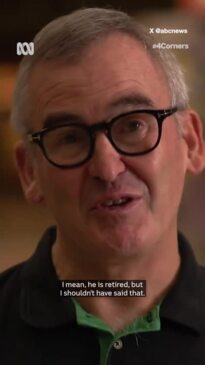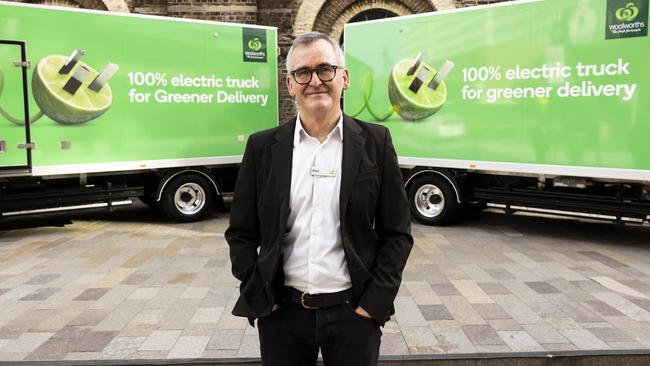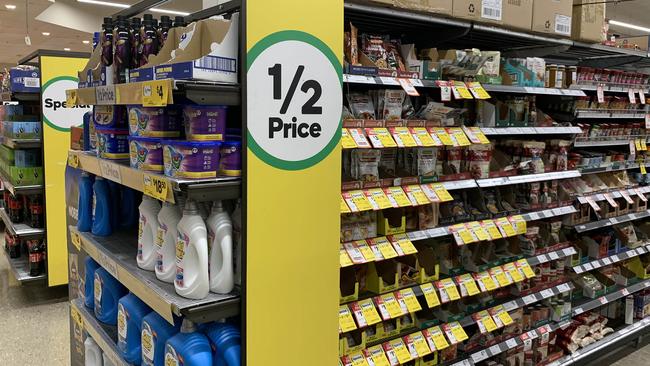Where it all went wrong for outgoing Woolworths boss Brad Banducci
Woolworths insists the abrupt exit of its CEO has nothing to do with his trainwreck interview, but media and brand experts say he had to go.

Retail
Don't miss out on the headlines from Retail. Followed categories will be added to My News.
ANALYSIS
Away from widespread customer anger over rising grocery prices and billion-dollar profits in the midst of a cost-of-living crisis, Woolworths boss Brad Banducci was highly regarded.
In business and investment circles, the South African-born retail giant was seen as something of a God figure, credited with turning around the supermarket giant’s fortunes in a few short years.
Indeed, in announcing Mr Banducci’s shock exit today, Woolworths chairman Scott Perkins praised his “outstanding leadership and contribution”.
“Brad has led a remarkable turnaround and transformation of the group,” Mr Perkins said of his eight years in the top job.

Evidence of that came with the company’s other big news today, that its supermarket business has just posted a staggering $929 million half-year profit, up 2.65 per cent on last year.
Woolworths insists Mr Banducci simply decided to retire, in a move totally unrelated to the Four Corners controversy that erupted on Monday and gained widespread attention.
But the abrupt timing, which market analysts didn’t see coming, is too coincidental for media and brand experts.
“The role of CEO is no longer solely about profitability and compliance,” Phoebe Netto, managing director of Pure Public Relations, said. “It includes being the public face of a business, and making sure that their personal image boosts the image of the business.”

And it’s not the only media storm Woolworths and Mr Banducci have weathered in recent times, the prominent PR identity pointed out.
“This is the second time in recent memory that a PR blunder has had a profound commercial and operational impact on Woolworths as a business,” Ms Netto said.
“And in both cases, the handling of the situation became a bigger story than the substance of it. First, the messy handling of its decision not to sell Australia Day merchandise, and now the handling of the Four Corners interview.”
On top of that, Woolworths is also contending with growing discontent from farmers over what they’re paid and several ongoing inquiries into price-gouging allegations.
Ms Netto believes Four Corners was the straw that broke the camel’s back, cheekily adding: “The CEO of Coles, Leah Weckert, isn’t looking for a new job.”
A PR nightmare
Dissecting Mr Banducci’s performance on Four Corners, Ms Netto said there were few positives to take away.
“It would have required compassionate and visionary leadership to come out of these many instances of scrutiny and criticism,” she said. “But even without that, it is possible to hold firm despite not being well-liked.
“However, his cagey demeanour gave the impression that he felt he was beyond scrutiny and that by addressing the media and the public he was doing us a favour.
“That is a very un-Australian response. We respect approachability, transparency and humility.
“When he treated the journalist like he were an employee or an under-the-thumb farmer, he cemented the image being painted about Woolworths – a seemingly untouchable giant that dictates how we will allow them to perform.”

Corporate media trainer Greg Dyett, a 30-year news veteran who runs Media Success, described the Four Corners interview as a “disaster” that didn’t need to happen.
“Brad Banducci’s walkout will definitely feature in my next media training workshop because he broke one of the cardinal rules – you never abandon an interview or allow yourself to be filmed walking away from a TV camera,” Mr Dyett said.
“His comments about Rod Sims were not that egregious so he should have just let it go and not drawn attention to what he regarded as a mistake.”

Chris Urquhart, director of Immediate Communications, works regularly with leaders on media, communications and confidence training and is a former journalist who worked at 9 News, A Current Affair and Today, said interviewee “missteps can have real-life consequences”.
“Executives who submit to interviews ought to understand that they might not like a reporter’s approach or their questions, but that they owe it to their business to deal with the questions calmly and with discipline and get a clear message across,” Mr Urquhart said.
Media and marketing commentator Tim Burrowes wrote in his Unmade newsletter that Mr Banducci should’ve been properly prepared for a hostile interview.
“The PR team had clearly put some thought into the encounter, dressing Banducci in [a] Woolies uniform, complete with ‘Brad’ name badge,” Mr Burrowes wrote.

Statements lacking substance
Associate Professor Sanjoy Paul from the University of Technology Sydney’s Business School said the major problem with the Four Corners story wasn’t the walkout, but what Mr Banducci said.
“To hear the Woolworths and Coles chief executives speak, you’d think their industry was highly competitive,” Mr Paul wrote in analysis for The Conversation.
Mr Banducci told the program that an average Australian community has access to the major supermarkets, as well as ALDI and a series of independents, plus the “ability within 24 hours to have a quarter of our store delivered by Amazon”.
“It’s an incredibly competitive market,” he said.
His rival Ms Weckert made similar claims, saying: “There are quite often comparisons made between the UK and Australia, but Australia has a third of the population, and we operate stores on a geographic footprint 30 times the size.”
But as Mr Paul pointed out, Woolworths and Coles control about 65 per cent of the grocery market in Australia, with Aldi accounting for another 10 per cent, and independents sharing the rest.

Mr Urquhart said the goal of a media interview should be all about building and emphasising trust.
“Leaders must always remember that they will be judged as much on what they say as how they say it,” he said. “The audience will ultimately form a view on whether they trust the spokesperson based not only on what they say, but how they say it, their tone, and their overall authenticity.”
How authentic Mr Banducci’s claims about the cause of price increases are will be determined soon enough.
The major supermarkets are facing heat on multiple fronts, including an inquiry by the Australian Competition and Consumer Commission, a looming Senate Select Committee grilling, and various probes at a state level.
In its submission to the Senate, Woolworths insisted grocery price hikes were driven by “cost increases from our supplier partners, and cyclical impacts in fresh food markets”.
That’s a view that might come as a surprise to many farmers who do business with Woolworths and Coles.
Farmer fury boils over
In December, Federal Agriculture Minister Murray Watt told news.com.au it “doesn’t pass the pub test that Australians are paying so much more for meat at the supermarket than farmers are getting for their livestock”.
The implication that Woolworths and Coles are charging more because suppliers are demanding more isn’t one that Mr Paul buys.
“Hundreds of farmers have little choice but to sell their crops to the big two, and little choice but to accept whatever is offered,” the academic said.
He referenced the experience of a cherry farmer, featured in the Four Corners report, who delivered 15 tonnes of his product to Coles, expecting roughly $90,000.
“Instead, he was told the fruit was not up to standard and was only able to get $5800 on the seconds market,” Mr Paul pointed out.
Ross Marsolino from Natural Earth Produce, a zucchini, tomato and eggplant producer in Victoria’s Goulburn Valley, recently shared a video on social media, revealing he was planning to “walk away”.
“We’re going to walk away from 80 acres today,” Mr Marsolino said. “Mate, we’re not retailing the right price to be able to keep the product moving and selling. Plain and simple.
“The supermarkets are making too much profit out of our crops. We can’t survive. As growers we can’t afford to pay the workers, 50 people are going to be out of the system looking for work.”

And Far North Queensland farmer Shaun Jackson, owner of Daintree Fresh in Lakeland, warned Aussie consumers face a looming crisis as growers “across the country” exit the industry in coming years as result of similar issues.
“I guarantee you that people in Australia are going to run down on food,” Mr Jackson said.
Wading into the culture wars
Last month, Woolworths found itself in the spotlight after announcing it wouldn’t be selling any Australia Day merchandise in its stores.
“There has been a gradual decline in demand for Australia Day merchandise from our stores over recent years,” a spokesperson said.
“At the same time there’s been broader discussion about January 26 and what it means to different parts of the community.”
Those in support of efforts to change the date of the country’s national day initially welcomed the news, while Australia Day fans and conservative commentators went on the attack. Opposition leader Peter Dutton even called for a boycott.

Mr Banducci agreed to a breakfast television interview, appearing on Today where he copped a lashing from host Karl Stefanovic, who asked if Woolworths was “anti-Australia”.
“Karl, we are a very proud Australian company,” Mr Banducci replied. “We’ve been around for 100 years. We have 178,000 hardworking team members who are going to be in store doing the right thing for our customers on Australia Day, and we’re passionate about this country.”
Mr Banducci offered a number of concessions – that the decision was predominantly commercial in nature and had actually been made almost 12 months earlier, that the company supported people celebrating Australia Day, and that stores would be “decorated in green and gold” on January 26.
The pivot sparked further backlash, this time from those wanting to change the date. They felt the gesture wasn’t really virtuous at all.
Leaked messages from an internal staff discussion forum also showed discontent among some of those inside Woolworths.
Mr Banducci apologised for how Woolworths had handled the decision.

Aussies are fed up
Much like Qantas and its former chief executive Alan Joyce and Optus and ousted leader Kelly Bayer Rosmarin, Australians seem beyond frustrated with Woolworths as both a business and a brand.
Kanika Meshram, a lecturer in marketing at The University of Melbourne, analysed more than 10,000 comments on the social media forum Reddit across multiple Australian threads.
One term came up frequently – ColesWorth – which implies many see no real difference between the two supermarkets.
“This suggests a real public image problem for Coles and Woolworths, as the actions of one chain come to influence how the other is perceived,” Ms Meshram said.
“Many Redditors expressed concern about what they saw as a duopoly, a term that showed up frequently.
“Many [also] expressed concern about supermarket profits. One commenter wrote: ‘They can charge higher and higher prices for basic necessities, and there’s nothing we can do about it except pay up or starve.’
“Another said: ‘Big business changes when its customers revolt; in a profit-focused world it’s boycott or accept.’”

Social media doesn’t encapsulate the entirety of Australian society, and Reddit isn’t representative of social media, but “the anger on display” is clear, she said.
“The comments I analysed show the supermarket pricing story is not just a media beat-up. People are talking about the issue, suggesting a shift to supporting local or cheaper businesses and calling for government action on pricing.”
Lessons to learn
Woolworths must now return to its core offering while nurturing both customers and stakeholders, Nicole Reaney, chief executive of InsideOutPR, said.
“Woolworths was once celebrated as a wholesome family grocer,” Ms Reaney said.
“It steered from political stances and focused on providing customers with a quality range and added value. It initiated successes such as free fruit for children, collectables and investments in technology and delivery services.
“Brad was in the business or at the helm during these positive times.
“The demise has surrounded market power, supplier relationships and the price/demand pressures it places particularly on Australian farmers who produce short term perishables for a significant financial investment.
“It’s been criticised for price gouging at a time consumers are battling the ability to afford basic goods. Its vocal political stance and Australia Day handling created division rather than inclusion and subsequently received backlash through customers and media.
“Returning to the core of its offering, nurturing all customers and stakeholder relationships will be vital to its future.”
More Coverage
Originally published as Where it all went wrong for outgoing Woolworths boss Brad Banducci




